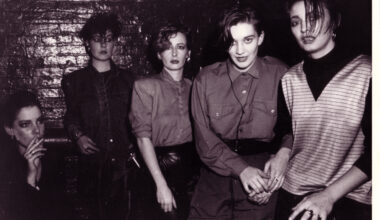A desert earth, marauding tribes of murderous religious zealots, and a vengeful father called Ruin, Gary Numan’s new album is a riot of misery, anxiety and epic synth hooks…
Date: The Future (never date your future dystopia, because one day the date comes around in real life, and it always turns out that we’re not driving hover cars and hunting replicants in permanent rain, and then people point at you and say “Ha! He got that wrong!”)…
Location: Somewhere arid on planet Earth (never be too specific about the location of your future dystopia, because… see above). You become conscious, you don’t remember passing out. Through barely open eyes, you can see a rotting shack, evidence of the death of a civilisation. Dotted across the landscape are misshapen dark lumps. Perhaps they are small mounds of detritus, sacks of rubbish, bin bags. But wait, no, they’re corpses. Fear grips you once more. What has happened here? Why is it so hot? You need water…
On the horizon, a figure appears, distorted by heat haze. He approaches. Only his eyes are visible through a narrow slit in his strange desert garb. Who is this person? What do they want? Are they hostile? A warrior? Are they here to finish you off? As he comes closer you notice his piercing blue eyes. So blue… like fresh water… your tongue passes over your cracked lips. So thirsty. You gaze up at him as he stands over you. Oh wait, it’s Gary Numan! “Gazza!” you moan. “Help me!”
“My name is Ruin,” he snarls.
“Oh dear,” you reply. “That doesn’t sound good, this is much worse than ‘The Man Who Fell To Earth’.” The sound of a massive electronic beat emerges from nowhere and overwhelms your consciousness. Somewhere in the darkness a melody so beautiful and stirring swirls around. You can almost touch it, but as you think you’ve grasped it, it twists away from you cruelly. Darkness overwhelms you again.
When you come round, Gary Numan is sitting opposite you in an 18th century house in Soho that is now a private members’ club. Between you is your recording device, its little red light blinking reassuringly. He’s sipping a Coke with ice cubes in it.
“Alright?” asks Numan.
“Yes thanks Gary,” you reply. “How are you?”
“Well, I’ve just done five gigs,” he says. “I only had about three hours sleep last night, and today I thought I might have a spot of hay fever coming on, so I took a hay fever tablet, and it made me feel really sleepy. I nearly nodded off this morning during an interview. It was so embarrassing.”
Gary Numan is entertaining the press in London, talking about his new album, ‘Savage (Songs From A Broken World)’. It’s a sort-of concept album, loosely describing a world that has suffered catastrophic climate change, peopled by tribes whose currency is water and whose main occupation is surviving. It’s stuffed to the gills with Numan hooks, great big air-punching electronic riffs beefed up with metal guitars and utterly distressed with bit-crushed beats and fucked-up noise.
“I did work quite hard on the choruses, I wanted them to be anthemic, ‘here comes the good bit’ type songs,” he smiles.
We’ll come back to ‘Savage (Songs From A Broken World)’ and its sci-fantasy themes in a bit. In the meantime, here’s another future sci-fi dystopian vision for you.
A musician sits in his music creation pod, isolated from all external inputs, tethered to his insatiable audience via some devilish future technology which allows them to see his every move, to prod him and cajole him when he displeases them, and to reward him with dopamine hits of positive feedback when he delivers what they want.
This musician’s fear is that one day he will be discarded by the fickle, anonymous legion of fans, known only to him by their on-screen names. If that happens he’ll be ejected from his creation pod, the only reality he’s ever known. They witness his anguish as he tries to write music, and his personal life starts to unravel with domestic tragedies and tensions. He’s locked in a draining feedback loop that he can’t seem to escape from…

Numan chose to make ‘Savage (Songs From A Broken World)’ via PledgeMusic, the online direct-to-fans platform that artists use instead of a record label to reach fans, offering various inducements and packages to raise the cash to make the record. Often the album is already in the can when the artist takes it to PledgeMusic. With typical openness, Numan had no music ready when he started his own campaign. The idea was that he would give the fans an open window onto his creation process, from start to finish. All the failures, false starts, the half-ideas, the stupid cul-de-sacs, the banging your head against a Jupiter-8, he was going let everyone see it all.
He’s not going to indulge in my future dystopian vision (my enthusiastic description elicits nothing more than a wan smile), but he does concede he felt a different kind of pressure around the process.
“The campaign started on 9 November 2015, and that was the day I wrote the first note,” he says. “It was a bit weird, when you’re putting out things that are not only unfinished, but you know they’re not going to be the final version, or perhaps even make it onto the record. These are things you would normally keep very hidden until you get it right, so to release things that are wrong so you can illustrate the point that you know there’s something wrong with it, so people can see how we fix it and improve it, to be putting out known mistakes, it was difficult, but that was part of it. That’s what we promised we would do.”
It seems to be the Numan way, to make himself an open book for his fans. Last year’s documentary, ‘Android In La La Land’, for example, was a revealing portrait of the Numan clan – his wife Gemma, an extraordinary force of nature and Numan’s saviour, and their three daughters, Persia, Echo and Raven – and their move from the UK to LA, alongside the making and release of his last album, ‘Splinter (Songs From A Broken Mind)’.
Throughout the film, Numan and Gemma are almost painfully emotionally naked, talking about the bouts of depression they both suffered, the breakdown of his relationship with his parents, and the subsequent reconciliation, and all of the fears and insecurities his chequered career has bestowed on him. Is this openness part of a necessary strategy for the 21st century pop star?
“I think it’s the right way to do it,” says Numan. “It suits my personality, I’m not good at being devious, and I don’t have anything about my work that I feel needs to be hidden.”
The PledgeMusic campaign reached 255 per cent of its target, with over 6,000 people putting their hands in their sometimes quite deep pockets to snag the album on various formats, and other goodies like the Yamaha CS-5 that was used on ‘Telekon’ (£1,000), his lovely Roland System 100 Model 101 keyboard (£1,205) and an Oberheim OB-XA (£2,343). The Numan social media communication machine is an artful mix of commerce and warmth. What Numan does, after all, is business. And he’s no ingenue.
“There’s a certain amount of strategic thinking,” he agrees. “There is an element of manipulating enthusiasm, to make sure it’s at the right pitch at the right time, but that’s a pretty light way of doing it. I know it can be done in a more aggressive way. If I do a couple of posts about tickets or selling something, I make sure that’s there a few family ones after that. It is my living, but I don’t want it to be an onslaught of ‘buy this, buy that’. I want the family to be a part of it, I want the fans to know about other things, a retweet of saving some elephants somewhere, other interests we have and things we do outside of music, it’s just letting them know what’s going on.”
His family are certainly a big part of the Numan narrative. There won’t be any even half-serious fan who isn’t aware of Gemma and the children. There was a series of hilarious tweets from the Numan family holiday last year, many of which were Numan venting his frustration at a car full of bickering children, a situation any parent will instantly recognise. But the night before we meet, there was collision between family and fans, which Numan was sufficiently irritated by to share it with his 192,000 Facebook followers.
At private launch event for the album, organised by BMG who have licensed ‘Savage’, several dozen fans were invited (their names picked out of a hat). Free booze and over-enthusiasm meant the party was getting raucous, at which point Numan decided to remove his children, taking them by the hand through the crowds to get them somewhere quiet. But it seems he wasn’t able to exit smoothly. He got grumpy, as he puts it. He lost his patience and snapped at the fans who were in his way and kept asking for autographs and wanting to monopolise him. And then he took it to Facebook, causing something of a minor shitstorm.
“If I was 21 and I was the big pop star of the moment and the audience were all about 13, then you’d rightly expect it to get a little bit out of hand,” he says, speaking with authority as someone who has experienced that very scenario. “They’re not going to control themselves and will want to get to you at all costs. But I’m nearly 60, and most people in that room were in their 40s and 50s.”
The modern pop star relationship is so different from how it was when he first became famous. Numan’s seen that completely change. At the height of his pomp, he was a very isolated and aloof figure, with layers of management and security between him and his fans, but that’s melted away now.
“It’s only melted away because I’ve let it,” he says. “I’ve tried be a lot more approachable, and not have those layers between us. Most of the time it works really well, and we have a closer connection now than we had back then, but there are times when people need to grasp that things have changed, I’m not 21, they’re not 13 – my kids are. You have to look at the situation and not just think, ‘I’ve got an album to sign’, but ask yourself, ‘Is it appropriate?’.”
Incidentally, he says he doesn’t look at the comments on social media. “I don’t care whether they agree with me or not,” he says. He’s really not like our future muso in his creation pod at all.
Back to the album, then. It turned out to be an apocalyptic vision of society destroyed by climate change. Its imagery is all desert heat, collapse of civilisation and judging by the video for the lead single, ‘My Name Is Ruin’, which stars his daughter Persia, it doesn’t look like there are any nice bathrooms in this grimly overheated world.

The story he’s pilfered to provide the character of Ruin and the sense of narrative that runs through the album comes from a novel. Numan’s no stranger to lifting ideas from sci-fi books for his songs. The first couple of albums abound with snippets from Philip K Dick short stories in particular, but ‘Savage (Songs From A Broken World)’ has a source closer to home, a novel he’s been working on for years.
“It’s my first attempt at an epic fantasy novel,” he says, “and to be honest, although I’ve got thousands of ideas for it, progress has been painfully slow. I’ve had it around for a while. I borrowed a couple things from it for ‘Splinter’.”
For ‘Splinter (Songs From A Broken World)’, Numan had a huge cache of recently experienced personal anguish to mine for material. This time round he admits he didn’t know what to write about. “Life is pretty good, I’ve got no angst,” he shrugs. And so he started to liberate ideas from the book, and then American politics aligned with what Numan was writing.
“Trump suddenly announced that he was going to pull out of the Paris accord,” he says. “I thought, ‘God, that’s stupid, but fantastic!’. It gave me some real world relevance. Now I’m actually writing about something that isn’t just some poncey sci-fantasy story, this is something that might actually happen. This is potentially a real future thanks to Trump, and that gave it a lot more focus and enthusiasm.”
What used to seem like entertaining fictional future-gazing now feels like a comment on imminent possibility. Take a look at the horror that passes for every day life in parts of the world like Syria and ISIS-controlled chunks of Iraq. These things were not, Numan claims, on his mind, and yet the album is filled with references to religion, to prayer, to God’s intentions and the music itself resonates with approximations of Arabic scales and spills over with references to religion.
In his novel, he reveals, one tribe discovers a scrap of a religious document, the ‘Bible’, and decide they’ve been chosen, and then they need to convert other tribes to their belief in this snippet, using violence if necessary, “cleansing” as he puts it. Is ‘Savage (Songs From A Broken World)’ a reaction to the terrorist and holy war landscape we’re now living in?
“It’s not about terrorism,” insists Numan. “It’s about religious fanaticism, we’re looking more to the Crusade type of approach, where it was all about converting. If converting meant killing because they wouldn’t convert, that seemed like an acceptable thing to do, but it’s more that old school way of going about it.”
You know how the people who seem the most homophobic often turn out to be the most tortured by their own sexuality? Has he ever thought that his well-documented antipathy to religion might contain some of that? That in some way he is looking for answers?
“I’m interested in the impact it has,” he says. “I’m interested in how such terrible things are done in its name, on a day-to-day basis. I’m interested in how religion affects politics, especially at the minute in America, its influence, its reach, how it can possibly still exist in the modern world, I find it really, really interesting. It just keeps coming back to me. Large parts of ‘Savage’ have nothing to do with it, but it is a key sub story.”
When Numan was 13, he decided he had enough of being taught about religion as if the stories it told were true. He wrote to his head teacher to register his objections, and was excused religious instruction for the rest of his time at school. They replaced it with extra maths, but still, young Gary Webb had made his stand and won. Which brings us to another strong theme throughout Numan’s work, the experience of the outsider, the outcast, the isolated wronged individual.
“I think that’s the Aspergers side of me,” he says. “As much as you learn to deal with it and find ways around it so it’s less of a problem, it doesn’t go away. It’s always there. There’s the feeling that you’re not a part of things the way other people are, that you’re not natural around people the way other people are.”
He still panics when he and Gemma are out for an evening and she leaves his side for any reason.
“If we’re chatting to people and she decides to go off to the toilet, I’m like a man who just fell off a boat with sharks all around, panicking just waiting for her to come back,” he says. “That’s my lifeline, her coming back, I’ve got my eye on the toilet door, I don’t know what to say, it’s really awkward.”
He doesn’t have any problem in an interview situation, because the conversation is structured and has a clear purpose and set parameters.
“It’s the chit chat in a social setting, I’m no good at it,” he says. “And I’m counting all the time. I count eye contact.”
You do what?
“I have a three and five second rule. If I look into people’s eyes for more than five seconds I’m being too intense, if it’s less than three it gives the impression I’m not invested in what they’re saying.”
That’s very complicated.
“It is.”
It must be very tiring.
“It is. I find chatting nerve-racking, awkward and tiring.”
Which brings us back to that curious incident of the fans in the nighttime, the launch party. The life of the touring rock star has a limited shelf life, after all. He tried to jack it all in before, announcing his retirement in 1981, drawing yet more media ire for the David Bowie-ness of it.
The last time we spoke to Numan he told us that his move to LA was partly inspired by a hoped-for career shift away from touring and into film music. Although he has written a couple of film scores, he’s no longer so interested in pursuing that path, and is happy with the prospect of recording and touring for a few more years yet.
“I’m 60 in March,” he sighs. “But I still look alright, I still look a bit younger than I am. I don’t want to stop, I just thought I was going to have to.”
His plan now for a creative and age appropriate career path is to focus on the novel.
“I see myself ending up as a novelist, rather than a score writer,” he says. “I still think there’s a need to move into something else, but it doesn’t need to be soon. And with the writing it can be done in conjunction with music. If you do a film score it takes you away from your own project for many months. If I’m writing books, I can do that in the evenings and work in the studio in the day time. I love touring and I love making albums, so I don’t want to just stop doing them if I can help it.”
That will come as a relief to his expanding and vociferous fan base who, on the whole, understand the nature of their relationship with the alienated and awkward young man who was the object of their teenage adoration and who is now pushing 60. Nearly 40 years later, Numan is an accessible and affable elder statesman of electronic music, and a figurehead for 100,000 kids who bought ‘Are “Friends” Electric?’ in 1979 who also find themselves 40 years older, still dressed in black, and still thrilling to the sound of a massive Numan synth riff. This “friend” is still electric, and he hasn’t broken down yet.
‘Savage (Songs From A Broken World)’ is out via BMG






